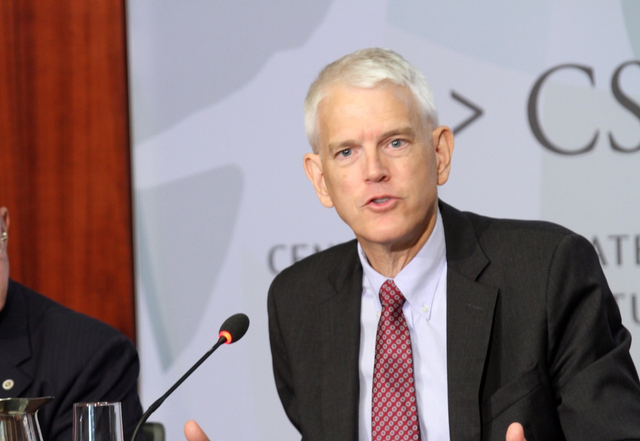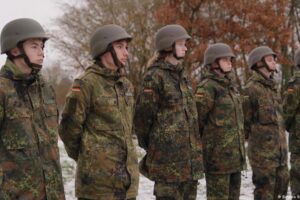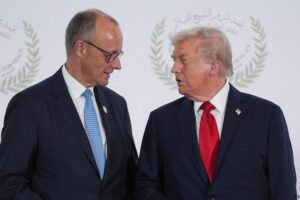
WASHINGTON, DC – A veteran American diplomat is casting serious doubt on the White House’s latest efforts to broker an end to Russia’s war in Ukraine, arguing that Moscow is exploiting the process to its advantage and that President Donald Trump’s approach is destined to “fail.”
In an interview with Kyiv Post on Monday, Steven Pifer, who served as US Ambassador to Ukraine from 1998 to 2000, spoke bluntly about the recent diplomatic flurry involving Moscow and Kyiv.
JOIN US ON TELEGRAM
Follow our coverage of the war on the @Kyivpost_official.
White House meeting: “Frustrating” outcome
Pifer believes President Volodymyr Zelensky’s visit to the White House last week was compromised by the US President’s prior engagement with his Russian counterpart.
“Clearly, President Trump got played again by Putin in the phone call on Thursday,” Pifer stated. “I think you had a very different outcome on Friday than you might have had two days before,” he added.
The core frustration, according to Pifer, stemmed from Trump’s apparent push for Ukraine to cede territory. “It must be very frustrating to President Zelensky and the Ukrainians that it appears the White House does not understand why they are not prepared to give up all of Donetsk,” he said.
He strengthened this point by highlighting a deeper misunderstanding from the American side. “It was also frustrating to me that apparently Mr. [Steve] Witkoff, again, said, well, ‘because everybody in Donetsk speaks Russian, they want to be Russian,’ which I think is decidedly not the case,” he said.
Other Topics of Interest
Ukraine 2.0 — The Power of People | Kyiv International Economic Forum 2025
The 11th Kyiv International Economic Forum united over 1,000 leaders to discuss Ukraine’s growth, resilience, and people-powered recovery – raising over $70,000 to support national defense.
Pifer emphasized that holding the line in Donbas is a strategic imperative: “Giving up that territory would mean surrendering the defensive lines that have stopped the Russian army now for three and a half years,” he said, adding, “I’m just puzzled as to why they don’t understand why that is simply, at this point, something that Ukraine cannot do.”
This assessment aligns with Trump’s earlier comments on Air Force One that Ukraine should simply “stop at the lines where they are – the battle lines… go home, stop killing people, and be done,” effectively freezing the conflict where Russian forces currently stand.
Sinking hopes for White House assistance
Pifer sees little prospect for meaningful support from the White House, especially in pressuring Russia. He argues that Trump is “not prepared to make the investment in achieving a settlement.”
“If he were serious about this,” Pifer argued, Trump “would be looking for ways to provide additional pressure on Russia.” Pifer elaborated on what that pressure should look like: “He would be putting pressure on Moscow to change that calculation by Putin, to make Putin understand that continuing to try to win on the battlefield will fail and will only mean more political, economic, and military costs for Russia.”
He believes that without consequences for non-compliance, the White House’s efforts will be in vain. “Trump, the way he is pursuing his mediation effort now, will fail because he is not prepared to do things to Putin when Putin does not negotiate seriously,” he argues.
This skepticism is underscored by Trump’s reversal on a key Ukrainian request. After suggesting he might provide long-range precision Tomahawk missiles, the US President walked back the idea, saying, “We have to remember one thing: We need them for ourselves, too. You know, we can’t give all of our weapons to Ukraine.”
Pifer advises Kyiv and European allies to adjust their expectations. “I would put those odds at less than ten percent” that Trump will ultimately be a helpful factor.
Budapest summit: Putin play
The former diplomat views the selection of Budapest for the upcoming Trump-Putin summit as a win for Moscow.
Pifer elaborated, “I think the Russians are certainly happy to go to Budapest. It’s one of the few places in Europe where they actually could have met.”
He cautioned that the meeting could just be “a repeat of what happened in Alaska, where it looked like President Trump was persuaded by Putin to agree to this so-called ‘understanding’, which had a number of traps in it for Ukraine.”
Pifer is highly doubtful that the summit will achieve a breakthrough: “I’m not sure, given, at least publicly, the Russian position remains unchanged, why does anybody think that Budapest is going to yield a different outcome than Alaska did?”
Zelensky has already publicly rejected the choice of venue, stating, “I do not believe that a prime minister who blocks Ukraine everywhere can do anything positive for Ukrainians or even provide a balanced contribution,” a clear reference to Hungary’s Kremlin-friendly leader, Viktor Orbán.
Zelensky also warned against the historical symbolism of the location: “Another ‘Budapest scenario’ wouldn’t be positive either,” a clear reference to the 1994 memorandum that failed to protect Ukraine’s territorial integrity.
Pifer agrees: “Whether or not the Russians were thinking of the symbolism of going to the place where the Budapest Memorandum was signed back in, I don’t know. My guess is that President Trump is not even aware of the Budapest Memorandum,” he said, adding, “I just think because Trump likes Orbán, he’s inclined to go to Budapest.
Advice for Kyiv and Europe: Keep the door open
Despite the bleak outlook, Pifer offered a clear piece of advice for President Zelensky: “Do not burn bridges with Washington.”
“You want to keep open the possibility that something good might happen,” the former Ambassador said. He suggests Zelensky is handling the difficult situation “about as well as possible,” noting that ‘he’s not burning any bridges with Trump.”
Pifer also had specific advice for Europe: “I think the Europeans should follow President Zelensky’s example. They should not be burning bridges with the White House,” he said, adding, “But I think Europeans probably at this point need to come to a conclusion, as do Ukrainians, that Trump is not going to be of much help.”
He advises a dual strategy: “Zelensky needs to pursue the assumption that the United States will not be providing assistance,” and instead focus on alternative supply lines, such as the US selling weapons to NATO for them to pass on.
Pifer’s ultimate recommendation to the White House remains a focus on clear preparation and consequences: “You want to have the meeting prepared… Then also make clear that if Putin again says ‘no,’ as he said in Alaska, that there, in fact, would be severe consequences.”





